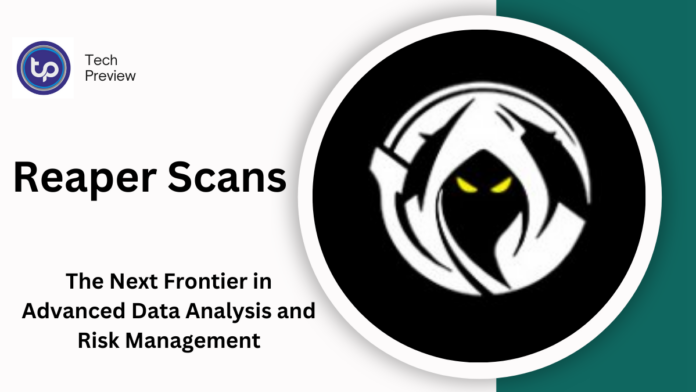As organizations face increasing pressure to secure sensitive data and enhance operational efficiency, innovative tools like reaper scans are gaining prominence.
These specialized scanning technologies have transformed industries such as cybersecurity, healthcare, finance, and marketing by providing deeper insights into system vulnerabilities and optimizing data management processes.
In this article, we will explore what reaper scans are, how they work, their benefits and challenges, and the exciting trends shaping their future.
Understanding Reaper Scans
Reaper scans are an advanced form of network and data analysis technology. Unlike traditional scans, which focus on surface-level issues, reaper scans delve into the deeper architecture of systems, identifying vulnerabilities and security threats that might otherwise go unnoticed.
The name “reaper” reflects the technology’s ability to “harvest” data from various networks and systems, offering businesses a comprehensive overview of their security posture. Initially developed to address rising cyber threats, reaper scans now play a critical role in a variety of industries by enhancing data integrity and ensuring systems remain secure.
The technology works by probing devices, network traffic, and system configurations, employing sophisticated algorithms that analyze large datasets.
What sets reaper scans apart from conventional methods is their ability to look beyond simple security checks, providing in-depth insights that improve overall security and operational performance.
MUST READ: Revo Technologies: Innovating the Future of Tech in Murray, Utah
The Versatile Uses of Reaper Scans
Cybersecurity
Reaper scans are essential for organizations looking to strengthen their cybersecurity measures. They are used to detect vulnerabilities in networks and systems, enabling businesses to take immediate action before any damage occurs.
For example, a tech firm used reaper scans to identify several security flaws, preventing a potentially disastrous data breach. The ability to perform comprehensive assessments gives companies a clear understanding of where their systems are exposed to cyber threats.
Financial Sector
The financial industry also benefits significantly from reaper scans, especially in fraud detection and risk management. By analyzing transaction patterns and identifying irregularities, these scans help banks and financial institutions detect fraudulent activities before they escalate.
One example involves a bank using reaper scans to improve its fraud prevention system, leading to a 30% drop in fraudulent transactions within a year.
Healthcare
For the healthcare industry, reaper scans offer a unique advantage in securing patient data and ensuring compliance with strict regulations like HIPAA.
Healthcare providers use reaper scans to monitor access to sensitive records, making it easier to track who’s accessing patient information and prevent unauthorized breaches. A hospital system that adopted reaper scans saw a drastic reduction in data breaches and unauthorized access to confidential medical data.
Digital Marketing
In digital marketing, reaper scans are used to gather and analyze customer behavior data, which helps businesses fine-tune their marketing strategies.
By examining data from various sources, companies can optimize campaigns in real-time. A popular e-commerce platform that employed reaper scans was able to improve its customer engagement and conversion rates, demonstrating the value of data-driven marketing.
The Advantages of Reaper Scans
Enhanced Accuracy
One of the major advantages of reaper scans is their ability to provide more accurate data than traditional scanning methods. Using advanced algorithms, they ensure that the collected data is reliable, which is particularly important for industries that depend on precise data, such as finance and healthcare.
Time Efficiency
Reaper scans significantly speed up the data analysis process, which is critical for businesses dealing with large datasets. In industries like finance or cybersecurity, where timely decisions are crucial, reaper scans offer a way to process and interpret data much faster than conventional methods. This improved speed leads to better decision-making and higher productivity.
Advanced Threat Detection
For cybersecurity professionals, reaper scans are an invaluable tool for detecting potential vulnerabilities and security threats. Their real-time analysis enables quick identification of weaknesses, helping organizations take swift action to prevent cyberattacks. This proactive approach ensures that systems remain secure and protected against evolving threats.
Streamlined Operations
Reaper scans also contribute to operational efficiency by uncovering inefficiencies in business processes. For example, manufacturers can use reaper scans to improve supply chain management, while agricultural businesses might use them to optimize crop yields and resource usage. By offering deeper insights into system performance, reaper scans allow organizations to fine-tune their operations.
Challenges Associated with Reaper Scans
Data Privacy Risks
Despite their advantages, reaper scans can raise concerns related to data privacy. Since these scans often involve processing sensitive information, there is a risk that data may be exposed or mishandled if not properly safeguarded. Compliance with data protection regulations like GDPR is crucial to mitigate these risks and ensure that sensitive data is kept secure during the scanning process.
Environmental and Contextual Limitations
While reaper scans are highly effective, they may not always be reliable in every context. Factors such as environmental conditions and user behavior can sometimes influence the accuracy of the scans. For instance, in complex network environments, reaper scans may need additional configuration to achieve the desired results.
High Resource Demands
Implementing reaper scans requires significant resources, including financial investment and specialized personnel. Small to medium-sized enterprises (SMEs) may face challenges when it comes to managing the costs and staffing requirements associated with deploying reaper scans effectively. However, as the technology evolves, it’s likely that solutions will become more accessible to a broader range of businesses.
Emerging Trends in Reaper Scans Technology
AI Integration
The integration of artificial intelligence (AI) with reaper scans is set to revolutionize data analysis. AI-powered reaper scans will enable real-time processing of scanned data, allowing organizations to make decisions faster and more accurately. This technology is expected to enhance risk assessment and quality control, particularly in industries such as manufacturing and healthcare.
Machine Learning for Predictive Analysis
With machine learning capabilities, reaper scans will be able to learn from historical data, enabling them to predict future risks and patterns.
This predictive analysis is especially valuable in fields like agriculture, where reaper scans could forecast crop health and environmental factors with exceptional accuracy, helping farmers optimize their operations.
Robotic Automation
The automation of reaper scans through robotic systems is another promising trend.
Businesses can reduce human error, increase efficiency, and lower operational costs by automating repetitive tasks such as inventory management and system inspections.
As automation technology improves, we can expect to see even more widespread use of reaper scans in industries where efficiency is key.
Conclusion
Reaper scans are proving to be a game-changer in the world of data analysis and cybersecurity.
They offer an in-depth, accurate, and efficient approach to scanning that provides valuable insights into system vulnerabilities and operational inefficiencies.
As industries continue to evolve, the integration of advanced technologies like AI, machine learning, and automation will further enhance the capabilities of reaper scans, making them even more essential for businesses across sectors.
While there are some challenges associated with their use, the benefits they provide make them an invaluable tool in modern data management and cybersecurity.
People May Ask
What are reaper scans used for?
Reaper scans are used primarily to detect vulnerabilities in networks and systems, enhance data security, and improve operational efficiency across industries such as cybersecurity, finance, healthcare, and marketing.
How do reaper scans improve cybersecurity?
Reaper scans help identify vulnerabilities in real-time, enabling organizations to address security threats before they escalate into serious issues.
Can reaper scans be used in industries other than cybersecurity?
Yes, reaper scans are also used in industries like finance for fraud detection, healthcare for data protection, and marketing for analyzing customer behavior.
What are the key challenges with reaper scans?
The main challenges include data privacy concerns, contextual limitations that can affect accuracy, and the resource-intensive nature of deploying reaper scans.
How will AI impact reaper scans?
AI will significantly improve the speed and accuracy of reaper scans by enabling real-time data analysis and predictive risk assessments, making them even more effective in various industries.
Click here to learn more.









